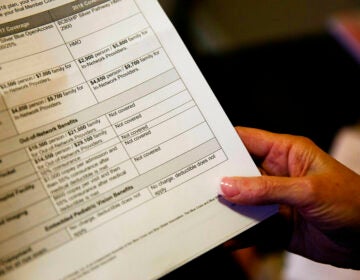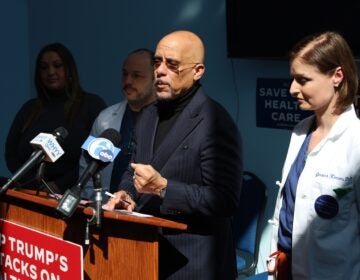Patients and families left in limbo as CHOP and Medicaid health insurers hash out new contract deals before June 30
CHOP officials say failed contract negotiations with two Medicaid health insurance plans could disrupt coverage for “thousands” in the region.
Listen 1:18
The exterior of CHOP in Philadelphia. (Children's Hospital of Philadelphia)
From Philly and the Pa. suburbs to South Jersey and Delaware, what would you like WHYY News to cover? Let us know!
Children’s Hospital of Philadelphia began warning some patients and families last week that the health network may no longer take their health insurance starting this summer.
The health system, which includes a flagship hospital in Philadelphia and a broader network of outpatient offices, is currently negotiating new contracts with Keystone First and AmeriHealth Caritas PA, two of the largest Medicaid insurers in the region.
The parties have not yet reached agreements on new coverage and reimbursement rates as they face a deadline of June 30, when current contracts expire.
In the meantime, families are left wondering what health care services will be covered through their insurance plans come July 1 and whether they need to find other options urgently. Local parents say it’s an even more stressful time for families with children who have serious conditions or complex medical needs.
“It’s just panic,” said Missy Levin of Lower Merion Township. Her daughter recently completed treatment and limb-salvage surgery for osteosarcoma bone cancer and continues to get follow-up oncology and rehabilitative care at CHOP.
The health system emailed and texted families with these insurance plans for primary or secondary coverage.
The notices explained that should contract negotiations fail, families could keep their current health insurance and switch to new health care providers, or switch their health insurance to maintain in-network care at CHOP.
CHOP officials could not say exactly how many patients might be affected by the outcome of the negotiations but stated that it would be in the “thousands.”
Levin and her family rely on Keystone First for secondary insurance to cover services and treatment not included in their primary plan. If insurers don’t reach new contracts with CHOP, she expects her family to face significant health bills.
However, Levin, a former school social worker, is even more worried about families who rely on these Medicaid plans as their primary and only insurance coverage for health care they get at CHOP.
“What do they do?” Levin asked. “I just think it’s a complete systematic failure. I think it has scared everybody who’s already dealing with special needs, and I think the bigger issue is money and I don’t know how to solve that.”
‘Back to the way they were’
Contract negotiations between insurance providers and health systems happen annually or every couple of years, and they are almost always private.
“The insured patients are none the wiser about what’s going on behind the scene,” said Mark Pauly, a health economist at the Wharton School at the University of Pennsylvania.
Negotiations may become public when insurers and hospitals struggle to come to a quiet agreement on the prices of health care services and the payments for providers who deliver them.
Pauly said it’s rare for negotiation issues to reach patients, but it has happened in the past. The period during the COVID-19 pandemic was a unique exception, when billions of dollars in federal aid kept hospitals and health systems financially supported as they temporarily stopped or delayed some profit-generating services.
At the same time, health insurers saved money because they were paying for fewer elective surgeries and non-emergency treatments. But that’s no longer the case, Pauly said.
“Now that things are, in a way, going kind of back to the way they were, these periodic episodes of arm wrestling between hospitals and insurers tend to break out again,” he said.
Pauly said letting patients and insurance beneficiaries in on negotiation updates is a duty to inform people about the potential outcomes and give them ample time to make decisions as a deadline approaches. It can also serve as a bargaining strategy to pressure each negotiating party to reach a deal faster.
Officials from CHOP and AmeriHealth Caritas, the parent insurance company for both Keystone First and AmeriHealth Caritas PA plans, said they’ll continue working to reach new contract deals before the final deadline.
“We continue to negotiate in good faith,” CHOP officials said in a statement. “We remain committed to delivering our patient families the best possible care experience, and our hope is that we can support them without any interruption.”
No health care services and insurance coverage changes will happen before July 1.
“CHOP is a valued partner in our efforts to provide our members in Philadelphia and the surrounding community with high-quality, accessible health care,” AmeriHealth Caritas officials said in a statement. While these contract discussions continue, CHOP remains part of Keystone First’s provider network.”
Wait and see, or act
Some families are choosing to wait and see what happens, hoping that new deals are reached sooner rather than later. But Amanda Jacobs of Philadelphia said some families can’t wait too long to make decisions.
Jacobs’ 3-year-old daughter, Fern, has been a patient at CHOP ever since she was born. She has Down syndrome and other medical needs.
“[Otherwise], you don’t have the time to put everything into place,” she said. “And for medically complex kids or kids with many different providers, it’s not something you could gamble on.”
The family has also been happy with their Keystone First insurance plan. Jacobs said that the prospect of changing providers or insurance is daunting.
“It is so unbelievably scary to lose these professionals who have such a strong baseline and understanding of how Fern works, and who know us as parents,” she said. “To start that over is not only daunting, I would be so grief-stricken.”
Jacobs and her family have chosen to wait until mid-April before pursuing any changes to their insurance or health providers.
Jacobs said this process might be relatively easy for some families. However, for others like hers, a change to insurance could affect a whole host of other services they get from other health companies that provide medical equipment and home health support.
“This should be the easy part where we should be able to have providers and insurance companies work together and thinking of families like us and kids like Fern,” Jacobs said. “This shouldn’t be as hard as it is.”
WHYY is your source for fact-based, in-depth journalism and information. As a nonprofit organization, we rely on financial support from readers like you. Please give today.






